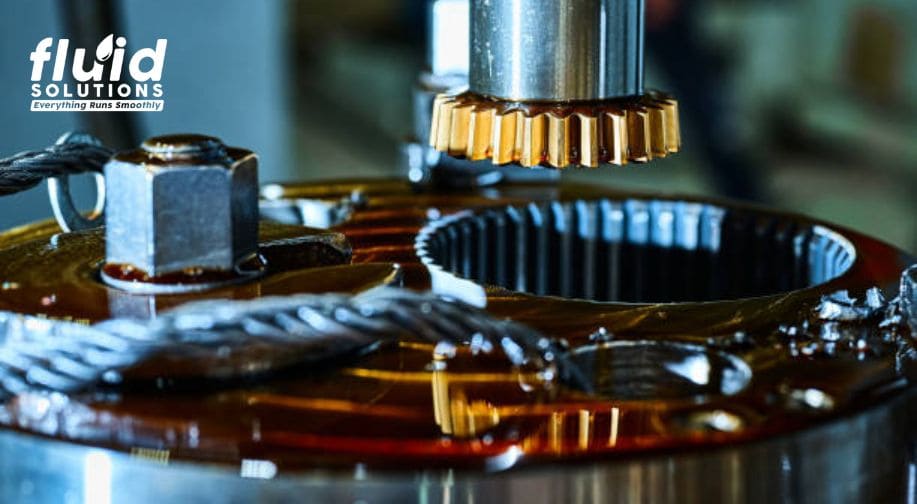
Industrial gear oils play a crucial role in machinery maintenance by reducing friction, preventing wear, and ensuring uninterrupted operations under varying loads and temperatures. Moreover, the right gear oil can optimize performance and extend the lifespan of industrial equipment.
The American Gear Manufacturers Association (AGMA) provides an industrial gear oil classification system that helps identify suitable lubricants for specific applications. Understanding these classifications and the formulations behind industrial gear oils will help in making informed lubrication decisions.
Understanding the various classifications of industrial gear oils is essential for selecting the lubricant to ensure optimal performance and longevity of machinery. This blog will explore the different industrial gear oils, their formulations, and suitable applications.
Key Takeaways:
- Gear oils reduce friction, wear and support smooth operation.
- AGMA classifies them as R&O, EP, Compound, and Synthetic.
- R&O resists rust; EP handles high pressure; Compound suits worm gears; Synthetic works in extreme conditions.
- Key factors: viscosity, shear stability, water resistance, and foam control.
AGMA Classification of Industrial Gear Oils
The classification system of AGMA helps industries select the most suitable lubricant for different gear systems, ranging from general-purpose applications to extreme pressure and high-load environments.
Each type of gear oil (Rust and oxidation (R&O), Extreme Pressure (EP), compound, and synthetic) offers unique advantages tailored to specific industrial requirements. Understanding these classifications enables maintenance professionals to optimize equipment performance, reduce downtime, and prevent costly failures. The following sections explore these categories, outlining their key characteristics, applications, and examples.
R&O (Rust and Oxidation) Gear Oils
Rust and Oxidation (R&O) gear oils are formulated with inhibitors to prevent rust formation and oxidation, ensuring long-lasting lubrication and stability. These oils are commonly used as multi-purpose lubricants for various industrial applications.
Key Characteristics:
- Provides excellent oxidation resistance to extend oil life.
- Offers rust protection to prevent component deterioration.
- Maintains gear oil viscosity and performance over extended periods.
- Suitable for moderate-load applications operating up to 200°F (93°C).
Common Applications:
- Lightly loaded industrial gear systems
- Turbines and compressors
- Circulating systems in manufacturing plants
- Paper mills and textile industries
EP (Extreme Pressure) Gear Oils

Extreme Pressure (EP) gear oils contain special additives, such as sulfur-phosphorus compounds, that enhance their ability to withstand high loads and prevent metal-to-metal contact under extreme pressure conditions.
Key Characteristics:
- High load-carrying capacity reduces gear wear.
- Contains anti-scuffing additives to enhance performance.
- Provides excellent protection against scuffing.
- Suitable for operating temperatures between 160°F (71°C) and 200°F (93°C).
Common Applications:
- Heavy-duty industrial gears and bearings
- Mining and construction machinery
- Automotive and marine transmissions
- Steel mills and cement plants
Compounded Gear Oils
Compounded gear oils comprise mineral oils blended with 3–10% fatty oils or synthetic fatty acids. These formulations enhance lubrication and reduce friction in worm gears, which operate under sliding motion. Below are the key characteristics and common applications for worm gear lubrication.
Key Characteristics:
- Provides superior lubricity for worm gear applications.
- Enhances efficiency by reducing energy loss because of friction.
- Reduces operating temperatures in enclosed gear systems.
- Suitable for operating temperatures between 160°F (71°C) and 200°F (93°C).
Common Applications:
- Worm gear systems in industrial machinery
- Textile and food processing equipment
- Elevator drive mechanisms
- Gear sets requiring extra lubricity and smooth operation
Synthetic Gear Oils
Synthetic gear oils are engineered using synthetic hydrocarbons, polyglycols, or polyol esters. These advanced lubricants offer superior performance in extreme conditions, making them ideal for demanding industrial applications.
Key Characteristics:
- High thermal stability ensures reliable operation in extreme temperatures.
- Excellent oxidation resistance extends oil life and maintenance intervals by a factor of two to three.
- Provides enhanced wear protection for gears and bearings.
- Low pour points for excellent low-temperature fluidity.
- Resistant to sludge and deposit formation.
- Suitable for operating temperatures above 200°F (93°C).
Common Applications:
- High-temperature gear systems
- Aerospace and offshore drilling equipment
- Industrial gearboxes exposed to extreme conditions
- Wind turbine gear systems
- Heavy-duty marine and mining equipment
Maximize Machinery Performance with Premium Industrial Gear Oils
Fluid Solutions Inc. offers a wide range of high-performance industrial lubricants, including premium gear oils designed for maximum durability and efficiency. Our advanced formulations provide superior protection, enhanced thermal stability, and extended oil-drain intervals, ensuring optimal performance in industrial machinery.
Key Benefits of Our Industrial Gear Oils:
- Outstanding wear protection to extend equipment life
- Enhanced oxidation resistance for prolonged lubricant performance
- Formulated for extreme pressure and high-temperature conditions
- Excellent thermal stability for continuous heavy-duty operation
- Environmentally friendly options available for sustainability-focused industries
Optimize your lubrication strategy with Fluid Solutions Inc. Call (02) 8370 5928 / (0917) 894 9156 or email via inquiry@fluidsolutions.com.ph to learn more about our comprehensive products and services.
Social Media Links:
Facebook: https://www.facebook.com/fluidsolutionsinc
LinkedIn: https://www.linkedin.com/company/fluid-solutions-inc


